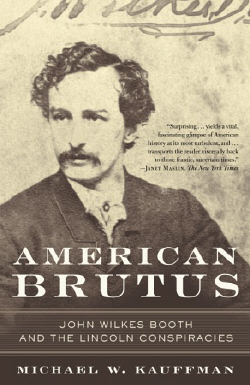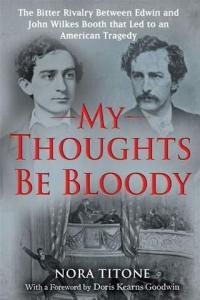Lincoln Assassination Books
Here are the four best books for details on the Lincoln Assassination.
American Brutus, by Michael W. Kauffman
 It is a tale as familiar as our history primers: A deranged actor, John Wilkes Booth, killed Abraham Lincoln in Ford’s Theatre, escaped on foot, and eluded capture for twelve days until he met his fiery end in a Virginia tobacco barn. In the national hysteria that followed, eight others were arrested and tried; four of those were executed, four imprisoned. Therein lie all the classic elements of a great thriller. But the untold tale is even more fascinating.
It is a tale as familiar as our history primers: A deranged actor, John Wilkes Booth, killed Abraham Lincoln in Ford’s Theatre, escaped on foot, and eluded capture for twelve days until he met his fiery end in a Virginia tobacco barn. In the national hysteria that followed, eight others were arrested and tried; four of those were executed, four imprisoned. Therein lie all the classic elements of a great thriller. But the untold tale is even more fascinating.
Now, in American Brutus, Michael W. Kauffman, one of the foremost Lincoln assassination authorities, takes familiar history to a deeper level, offering an unprecedented, authoritative account of the Lincoln murder conspiracy. Working from a staggering array of archival sources and new research, Kauffman sheds new light on the background and motives of John Wilkes Booth, the mechanics of his plot to topple the Union government, and the trials and fates of the conspirators.
Piece by piece, Kauffman explains and corrects common misperceptions and analyzes the political motivation behind Booth’s plan to unseat Lincoln, in whom the assassin saw a treacherous autocrat, “an American Caesar.” In preparing his study, Kauffman spared no effort getting at the truth: He even lived in Booth’s house, and re-created key parts of Booth’s escape. Thanks to Kauffman’s discoveries, readers will have a new understanding of this defining event in our nation’s history, and they will come to see how public sentiment about Booth at the time of the assassination and ever since has made an accurate account of his actions and motives next to impossible–until now.
In nearly 140 years there has been an overwhelming body of literature on the Lincoln assassination, much of it incomplete and oftentimes contradictory. In American Brutus, Kauffman finally makes sense of an incident whose causes and effects reverberate to this day. Provocative, absorbing, utterly cogent, at times controversial, this will become the definitive text on a watershed event in American history.
Assassin’s Accomplice by Kate Clifford Larson
 Set against the backdrop of the Civil War, The Assassin-s Accomplice tells the gripping story of the conspiracy to assassinate Abraham Lincoln through experience of its only female participant.Confederate sympathizer Mary Surratt ran a boarding house in Washington, and the depth of her complicity in the murder of President Lincoln has been debated since she was arrested on April 17, 1865.Calling upon long-lost interviews, confessions, and court testimony, historian Kate Clifford Larson magnificently captures how Surratt-s actions defied nineteenth-century norms of piety and allegiance. A riveting account of espionage and murder, The Assassin-s Accomplice offers a revealing examination of America-s most remembered assassination.
Set against the backdrop of the Civil War, The Assassin-s Accomplice tells the gripping story of the conspiracy to assassinate Abraham Lincoln through experience of its only female participant.Confederate sympathizer Mary Surratt ran a boarding house in Washington, and the depth of her complicity in the murder of President Lincoln has been debated since she was arrested on April 17, 1865.Calling upon long-lost interviews, confessions, and court testimony, historian Kate Clifford Larson magnificently captures how Surratt-s actions defied nineteenth-century norms of piety and allegiance. A riveting account of espionage and murder, The Assassin-s Accomplice offers a revealing examination of America-s most remembered assassination.
Manhunt: The 12-day chase for Lincoln’s Killer by James L. Swanson
 “The murder of Abraham Lincoln set off the greatest manhunt in American history – the pursuit and capture of John Wilkes Booth. From April 14 to April 26, 1865, the assassin led Union cavalry and detectives on a wild twelve-day chase through the streets of Washington, D.C., across the swamps of Maryland, and into the forests of Virginia, while the nation, still reeling from the just-ended Civil War, watched in horror and sadness.” “At the very center of this story is John Wilkes Booth, America’s notorious villain. A Confederate sympathizer and a member of a celebrated acting family, Booth threw away his fame and wealth for a chance to avenge the South’s defeat. For almost two weeks, he confounded the manhunters, slipping away from their every move and denying them the justice they sought.” Based on rare archival materials, obscure trial transcripts, and Lincoln’s own blood relics, Manhunt is a fully documented work, but it is also a fascinating tale of murder, intrigue, and betrayal. A gripping hour-by-hour account told through the eyes of the hunted and the hunters, this is history as you’ve never read it before.
“The murder of Abraham Lincoln set off the greatest manhunt in American history – the pursuit and capture of John Wilkes Booth. From April 14 to April 26, 1865, the assassin led Union cavalry and detectives on a wild twelve-day chase through the streets of Washington, D.C., across the swamps of Maryland, and into the forests of Virginia, while the nation, still reeling from the just-ended Civil War, watched in horror and sadness.” “At the very center of this story is John Wilkes Booth, America’s notorious villain. A Confederate sympathizer and a member of a celebrated acting family, Booth threw away his fame and wealth for a chance to avenge the South’s defeat. For almost two weeks, he confounded the manhunters, slipping away from their every move and denying them the justice they sought.” Based on rare archival materials, obscure trial transcripts, and Lincoln’s own blood relics, Manhunt is a fully documented work, but it is also a fascinating tale of murder, intrigue, and betrayal. A gripping hour-by-hour account told through the eyes of the hunted and the hunters, this is history as you’ve never read it before.
My Thoughts be Bloody by Nora Titone
 In some ways, Abraham Lincoln’s assassination at Ford’s Theatre was John Wilkes Booth’s most stunning theatrical performance. The assassin waited offstage until his cue (gunshot-muffling audience laughter); then burst into the president’s theatre; shot him and leaped onto the stage. According to historian Nora Titone, this play-stopping dramatic scene marked not just the end of Booth’s bombastic acting career; it was the climax of his bitter lifelong rivalry with his older brother Edwin. With persuasive force, Titone argues that John Wilkes’ jealousy of his sibling’s much more successful acting career fueled the hatred that culminated in a single violent act that changed history.
In some ways, Abraham Lincoln’s assassination at Ford’s Theatre was John Wilkes Booth’s most stunning theatrical performance. The assassin waited offstage until his cue (gunshot-muffling audience laughter); then burst into the president’s theatre; shot him and leaped onto the stage. According to historian Nora Titone, this play-stopping dramatic scene marked not just the end of Booth’s bombastic acting career; it was the climax of his bitter lifelong rivalry with his older brother Edwin. With persuasive force, Titone argues that John Wilkes’ jealousy of his sibling’s much more successful acting career fueled the hatred that culminated in a single violent act that changed history.
